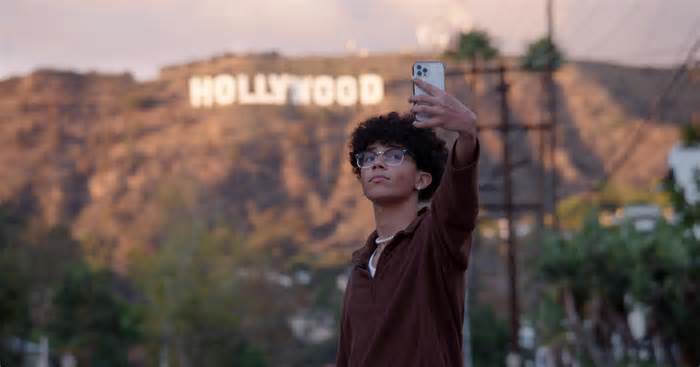“Chasing Fame” is the first episode of a new CBS Reports documentary series “Are Kids Okay?”, which explores the transformative adjustments facing today’s youth, in their own words. Watch it in the video player above or stream it on Sunday. April 24 at 8 p. m. Y or on-demand on the CBS News and Paramount app.
Jiggy Turner is the most prominent user in West Virginia. Or so he thinks.
“I mean on social media I’m the best known,” he said. “But Steve Harvey is also quite well known. “
At age 16, Turner has amassed more than 600,000 fans on the social media platform TikTok. And that’s only in the last two years. Its sudden popularity on the app has led to lucrative logo deals and opportunities to perform on screen. in every way, Turner lives the dream.
“Everyone needs to be famous,” he joked. Who needs to paint nine to five?”
Turner is part of a developing wave of influential teens who are eschewing classic careers in favor of a celebrity opportunity. Social media for money.
But lawmakers across the country worry that popular social media apps could simply create a crisis of intellectual fitness for America’s youth. The general counsels presented research into TikTok’s impact on children and teens as part of a customer coverage initiative. This is the latest extension of efforts to strengthen youth coverage online.
“While children and teens already suffer from issues of anxiety, social tension and depression, we allow social media to further damage their fitness and intellectual well-being,” said Massachusetts Attorney General Maura Healey, one of the GAs leading the investigation. .
In September 2021, leaked Facebook documents revealed knowledge about the destructive effects of the company’s Instagram app on young users, and teenage women paid the price. (Facebook’s parent company, which has since been renamed Meta, said Instagram “helps a lot of teens who suffer with some of the more complicated issues they face. “)One of the effects of the whistleblower’s revelations was the advent of the Children’s Online Safety Act, a law that would require corporations to create features that protect young people from the worst of social media.
Layla Ann VanHooser has first-hand wisdom about the dark aspect of social media. The 13-year-old gained around 100,000 fans on the app Musical. ly, which preceded TikTok. At first, the app was a lot of fun. But once Musical. ly purchased through TikTok, VanHooser’s fan base replaced and struggled to find a new audience that would connect with its content.
Most of its enthusiasts have left positive comments. “I would listen, oh my God, this woman is so funny,” he recalls. But many of her new fans had less than good things to say, calling her “grinding her teeth. “or insult their appearance. At the time, she was only 11 years old, and the comments hurt her. “My parents told me I wasn’t allowed to look at the comments,” she said. (Unlike TikTok, Musical. ly not limit content to users under the age of 13. )
VanHooser used humor to laugh at the bullies, a strategy that resonated with his fans. my eyebrows are there,” he joked. It was funny. Plus, I have eyebrows!These comments didn’t make sense. “
Now that VanHooser is 13, the minimum age to post videos on TikTok, he uses his comedy and dance for his anti-bullying message. “TikTok is for everyone,” he smiled. That’s the message I have for other girls. “
Even with the unsightly comments, when asked if she would like to be famous, VanHooser doesn’t miss a beat.
“I need to be famous. I would be so excited if I got the blue mark,” she said, referring to the small verification symbol the app provides to its maximum users.
Reducing social media use among teens can become a Herculean task. About 37. 3 million American teens use TikTok. The average TikTok user spends more than 24 hours watching content on the app per month.
“I can’t attend a movie all my life,” VanHooser said. But he said he could easily spend 4 hours on the app in one go. “I’m there and I’m moving. ” Even with the occasional bullying, the app, he says, is simply unbeatable.
After two years of building his subscriber base, Jiggy’s account was banned, supposedly overnight. A self-proclaimed “hacker” attacked him with a bot attack, continuously reporting Jiggy’s account for rape until, despite everything, TikTok simply shut down the account. hacker opened a new account.
“He essentially stole my photos, my videos,” Jiggy said. And then he took cash for promotions. “
Jiggy’s inbox was temporarily flooded with angry emails from potential customers, who hadn’t noticed the promised promotion on Jiggy’s account. The hacker, he said, had stolen their money. ” I feel like it actually broke my reputation. “
But Jiggy remains optimistic. He informed TikTok of the incident and is reviewing his account. In the meantime, he opened a new account. So far, it only has 50,000 subscribers, but it is developing rapidly. Jiggy says it was a vital lesson.
“In many ways, starting a liberation again. Like, I can post whatever I want. I don’t just want to keep my former enthusiasts happy. “
His new enthusiasts relate to the new Jiggy, who is older and wiser than when he was on TikTok two years ago.
“It’s been difficult, but it’s also an opportunity,” he said. He remains convinced that he will succeed.

